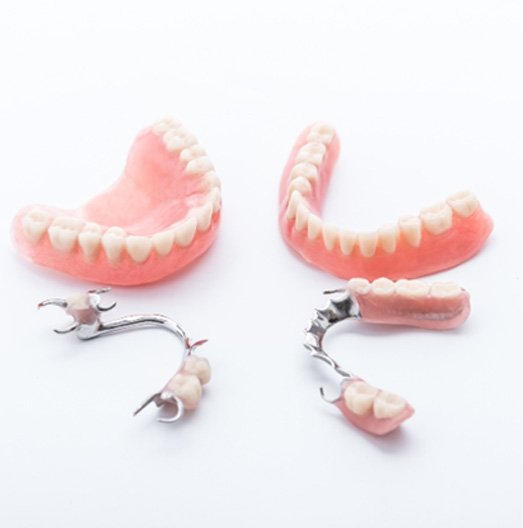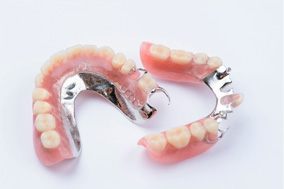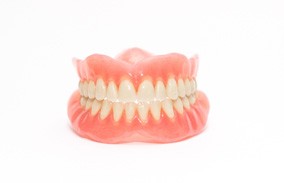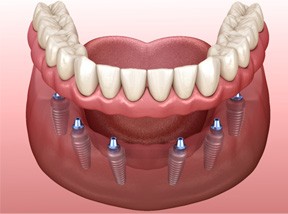Dentures – Northbrook, IL
Regain Your Smile!

Dentists often tell their patients that no matter the condition of their oral health, there are treatments that can help them. However, it can sometimes be hard for patients to believe that, particularly when they’re missing all of their teeth. It’s common for people who have suffered serious tooth loss to feel that they’re doomed to a life of a gummy smile.
Thankfully, that is far from the case. No matter how many teeth you’re missing, a set of dentures from Northbrook Dental Group can help you regain your smile! Make an appointment with us and we’ll be happy to talk to you about what a new prosthetic could do for you.
Why Choose Northbrook Dental Group for Dentures?
- Prosthetics Made from Sophisticated Materials
- Father-and Son Dentist Team Who Will Make You Feel Like Family
- Comfortable, High-Tech Dental Office
Who Is a Good Candidate for Dentures?

If you’re missing many of your teeth it can seriously impair your ability to lead a normal life. Whether you’re eating, talking, or just trying to make a good first impression, you’re likely to face difficulties if your smile is incomplete.
Dentures are an ideal treatment for patients who have lost most or all of their teeth. They also require healthy gums for support, so depending on your situation you may need to pursue gum disease therapy before you get your prosthetic.
Types of Dentures

There are various kinds of dentures out there, providing options for patients at all levels of tooth loss. We’ll be able to talk you through which choice is best for you when we meet you in person, but before that here’s what you should know about them.
Partial Dentures

Partial dentures are designed to help people who are missing some, but not all, of their teeth. They consist of acrylic false teeth on a metal base and can secure in place by clipping onto what natural teeth are left.
Full Dentures

On the other hand, full dentures are meant to replace all of the teeth on a gum ridge. Because there are no surrounding teeth to clip onto, these dentures are made entirely out of acrylic and are meant to comfortably adhere to the gums entirely via suction.
Implant Dentures

If you want something with a bit more stability, implant dentures could be helpful. The prosthetic is affixed to metal rods that are surgically placed into the jaw, affording them much greater strength and durability than they would have otherwise.
The Benefits of Dentures

Your teeth are essential for eating, speaking, and smiling with ease. That means having gaps in your grin can detract from your daily quality of life. Furthermore, the resulting changes in your appearance and abilities can damage your self-confidence.
Dentures are a versatile solution that can boost your sense of self by restoring your ability to chew and converse more normally. They also provide several additional advantages, which we’ve outlined below. Continue reading to learn more about the benefits of these artificial teeth, and feel free to contact us for more information.
Psychological Benefits

It’s not uncommon to have a hard time accepting the changes that come with tooth loss. People with dental problems are more likely to report feelings of anxiety and depression, as well as a lack of desire to engage with people socially. When you’re worried that you’ll be judged, you’re not likely to want to be around others and might be hard on yourself for circumstances that are somewhat beyond your control.
Thankfully, your dentist can provide dentures to help you rebuild your confidence. With them in place, you’ll be able to talk, eat, and grin without feeling as self-conscious.
Clearer Enunciation

Holes in your smile can also impact how clearly you can communicate. Your tongue presses up against your teeth to form certain sounds and words, and when they go missing, you might develop a lisp or other challenges.
Your prosthetics act as replacement teeth that help you speak more clearly. It can take about a month for your tongue and other supporting muscles to relearn the basics with your restoration in place. But with some time, practice, and patience, you’ll soon be speaking as smoothly as ever!
Improves Nutrition

Your body requires a variety of nutrients to function at its peak, but if you’ve suffered from tooth loss, you might not be able to eat the wholesome diet that you need. Many beneficial foods are hard or difficult to chew, like raw fruits and veggies or tough meats. If you have gaps in your grin, you might struggle to grind them down enough to be easily swallowed and digested. As a result, you can develop gastrointestinal issues or become malnourished.
With dentures in place, you can once again enjoy all your favorite meals.
Preserves Oral Health

Another advantage of this type of restoration is that it prevents any remaining teeth from drifting out of place. When there are wide spaces in your smile, they tend to shift out of alignment to fill them. This can lead to uneven wear and tear in your enamel, leaving your pearly whites more vulnerable to injury.
Dentures fill in the gaps to protect and preserve your natural teeth, which improves your overall oral health.
Expands Opportunities

One of the first things that people notice about you is the quality of your smile, and it’s natural to want to make a good impression. Dentures can be customized to be the perfect shape and shade to give you a lifelike smile that you’re proud to show off. By boosting your confidence, your artificial teeth can improve your chances of landing a promotion or securing a second date.
Dentures Aftercare

Your new dentures can help transform the appearance and function of your smile, but even if you have few or no remaining teeth, you should continue to go to the dentist regularly. Your dentist will continue to monitor any existing teeth and gum tissue and keep an eye out for any abnormalities that could indicate oral cancer. With dentures, it can be very difficult to notice these changes on your own, and early detection from your dentist can be key to making a full recovery.
Removeable Dentures

Remove After Eating
After each meal it is important to remove and rinse off your dentures. Doing so helps prevent the buildup of plaque and food debris. Never use hot water on your dentures, as this can warp the material and cause them to stop fitting properly.
Clean Your Restoration
Remove your dentures from your mouth completely to clean them. Then, using a soft-bristled toothbrush and a small amount of unscented hand soap, mild dish soap, or denture cleanser, gently brush the entire surface. Never use regular toothpaste on your dentures, as it is too abrasive and could cause them permanent damage.
If you will not be wearing your dentures again right away, carefully submerge them in a glass of water or denture cleansing solution so they don’t dry out and lose their shape.
Always be sure to rinse them thoroughly before putting them back in your mouth, as these cleansing materials are not intended to be in your mouth.
Keep Your Dentures Safe
Whenever you clean your dentures, be careful not to break them. Place a towel underneath them in case you accidentally drop them. This will cushion the fall and reduce the probability of damage. When not in your mouth, be sure to keep them out of reach of small children and pets.
Remove When You Sleep
It is important to remove your dentures each night when you go to bed. Wearing them restricts the circulation to your gums, which can lead to soft-tissue irritation. Sleeping with dentures has also been associated with a higher risk of pneumonia, as well as an increased level of gum and tongue plaque.
Once cleaned, store your dentures in a glass of water or denture soak overnight. Allowing them to dry out can cause them to permanently lose their shape.
Notice Changes
Regularly monitor your mouth for any changes so that you can address them with your dentist. These may include things like gum sores, irritation, or signs of infection.
Should your dentures become damaged, never attempt to repair them on your own, as you could accidentally damage them further. Instead, call Northbrook Dental Group as soon as possible for assistance.
If your dentures begin shifting, clicking, or showing signs of improper fit, let your dentist know as soon as possible, as your prosthetic may need to be relined or replaced.
